How to Keep Doors from Closing by Themselves
Author: Rick Worst | Editor: Omar Alonso
Review & Research: Jen Worst & Chris Miller
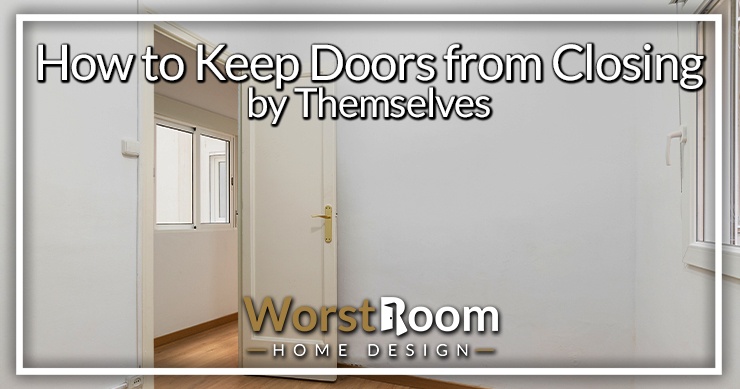
Does one of the doors in your home seem to magically close by itself? Relax, you don't have a ghost haunting your house; it's probably something else. Let's talk about how to keep doors from closing all on their own.
Doors can close by themselves for several reasons, from gusts of wind blowing through your home to problems with the alignment of the frame and hinges. Here we give you everything you need to know about how to stop this freaky occurrence from happening.
5 Reasons Why Doors Close by Themselves
The main reason most types of interior doors close by themselves is a misalignment between the frame and the door. The frame and door need to be level with each other when closed, or it creates an angle where the door wants to fall shut by itself.
A misalignment between the frame and door makes it easy to slam the door by mistake, causing damage to the hinges. While this is the most common cause of the issue, there are other contributing factors to when a door closes by itself; let's look at five common reasons for this occurrence.
1) Changes in Air Pressure
Open windows can change the air pressure in your home. There might be a lower air pressure outdoors, and the shift in pressure in the room causes the air to suck towards the window, pulling a door closed in the room.
2) Strong Winds
Strong gusts of wind moving through your home from an open window or door can cause it to slam shut, especially if there's a misalignment between the frame and the door. A gust could be so strong that you don't expect its force, ripping the door out of your hands when you close it, slamming it shut. It's quite a frightening experience.
3) Misalignment of the Frame & Door
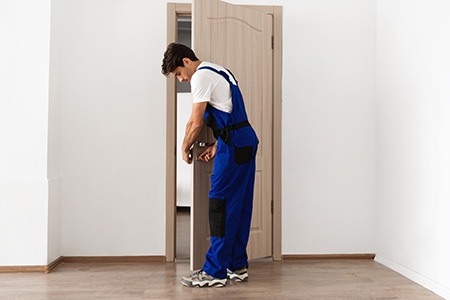
As mentioned, the most common cause of a door closing by itself is a misalignment between the frame and the door. With well lubricated hinges and a door that is too heavy up top, or even walls and floors that aren’t level due to a house and foundation settling, a door will slowly swing on its own until it meets resistance (aka closing).
4) Settling of the House Foundations
New homes tend to settle into their foundations over a few years. The effect of settling can create misalignments between the door, the frame, and the hinges, resulting in doors closing by themselves. This effect is more pronounced in areas that experience earthquakes and aftershocks, but it happens to all types of house foundations.
5) The Hinges are Misaligned
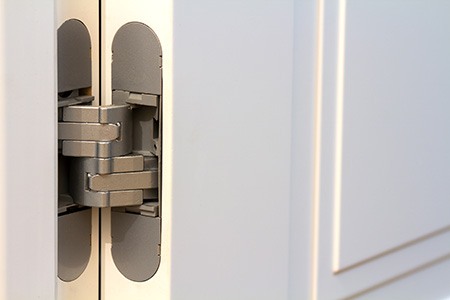
Along with the door and the frame being misaligned, a misalignment of the hinges can lead to the door closing by itself. Poorly installed door hinges create disproportion in your door, enabling its weight to lever itself shut. Fixing a sagging door properly always starts at the hinges, and doing this is a key step in how to keep doors from closing on their own.
How to Keep a Door From Closing by Itself
This section describes four items to check on and repair or tweak to actually solve the problem in such a way that it brings the door back to a level state where it should not close on its own.
1) Tighten & Lubricate the Hinges
Tightening the door hinges is the first strategy to try if you want to stop the door from shutting by itself. Open the door, and you'll notice screws securing the hinge to the frame and door. Tighten them with a screwdriver and see if it makes a difference. If the screws are tight, use some WD40 to lubricate them, and you'll find they turn easier.
2) Remove & Replace the Hinge Pin
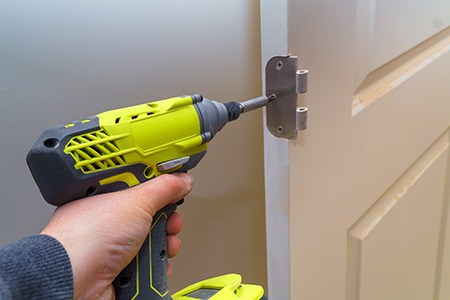
The hinge pin could be the culprit causing your door to close by itself. Place a star or Philips-head screwdriver on the top of the hinge pin facing the ceiling and give the top of the screwdriver a light knock with a rubber mallet.
The hinge pin should start appearing on the other side. Keep knocking until you remove it. Replace the old hinge pin with a new one. Remember to spray some lubricant into the hinge before knocking in the new hinge pin. Repeat this task for the upper and lower hinge.
3) Bend the Hinge Pin
A bent hinge pin could be the cause of the problem. Place a C-clamp around the pin and hold it in place. Take your rubber mallet and lightly pound the center of the pin to create a slight bend in the hinge, and you impede the door's ability to close by itself. Be careful not to overdo it.
4) Plumb the Door
A properly hung door won't close by itself. If the door isn't plumb, add shims behind the hinges, under the frame legs, or between the wall and the frame until it's plumb. The brickmold shouldn't matter on an exterior door. Use a level to ensure you have it right. You might have to play around with the shims until you get it level and plumb. Leveling the door in this way is a key step in how to keep doors from closing by itself.
6 Strategies to Prevent a Door from Slamming Shut
What this section is concerned with is stopping the loud sound of a door slamming shut from happening and disturbing you, your pets, your baby, and any other members of the family. We aren’t discussing how to repair a door, but how to keep a door open and/or how to at least dampen the sound it would make if it does swing shut on you.
1) Felt Pads
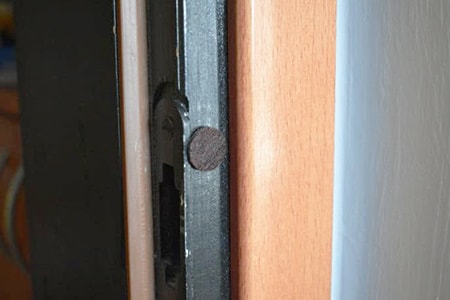
A cheap fix for the problem is to place felt pads along the edge of your door frame. Self-adhesive pads are easy to stick onto the door, making it a quick fix. However, this strategy won't stop the door from closing entirely. They're most effective on uPVC doors and don't work too well on heavier, solid doors due to the additional weight. You can also use weather stripping as a substitute for felt pads.
2) Wedge Stopper
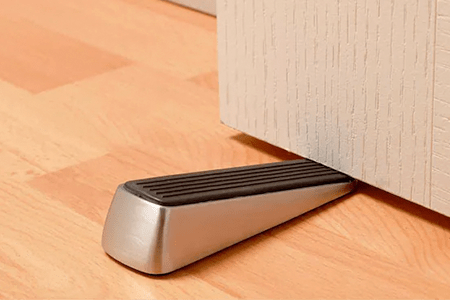
Door stoppers are another easy, affordable solution to prevent doors from closing themselves. Wedge the stopper under the base of the door, and it keeps it open. However, the wedge stop can be difficult to remove, and it might get annoying if you forget it's there and try to close the door, driving the wedge deeper and making it harder to get it loose.
It also presents a trip hazard for people entering and exiting the room. A lot of people want to know how to keep a door open without a door stop, and we have plenty of other choices to look at.
3) Hook Stopper
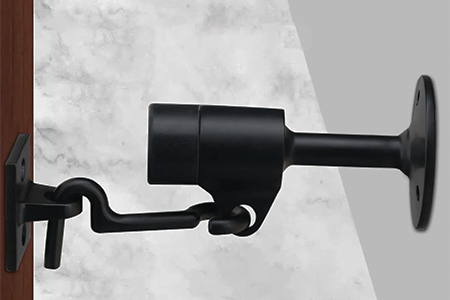
A hook door stopper is ideal if you want to keep the door open for long periods during the day. They feature a hook attached to the wall and a female fixture on the wall to hook into. Typically, they require fixing to the wall and or using screws, so it's not as simple as using an adhesive solution, but they work well.
4) Door Chocks
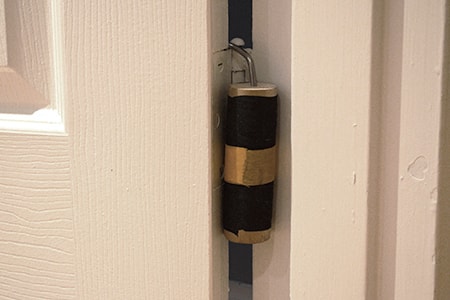
A door chock is a folding stopper, often used by firefighters when they enter a room to prevent the door from closing behind them, locking them in an area that's on fire.
5) Magnet Holds
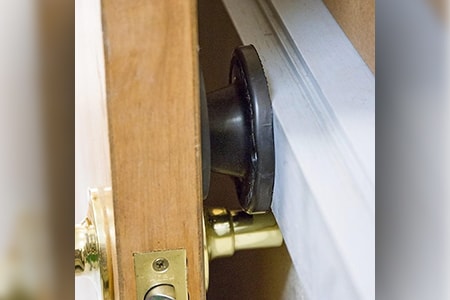
You can install a mag hold if your warehouse or office door doesn't stay open. They're ideal for fire-rated doors, ensuring they don't close randomly. Fire-rated doors are usually constructed with steel and are very heavy. They keep fires from spreading, holding back smoke.
You'll need the assistance of an electrician to wire the mag hold into your building's fire alarm system. The mag hold makes it nearly impossible to close the door manually. There are also magnet holds that don’t require all of that. They just hold the door with enough strength to keep it from closing, but not so much you can’t close it when you want to.
6) Closers With Hold Arms
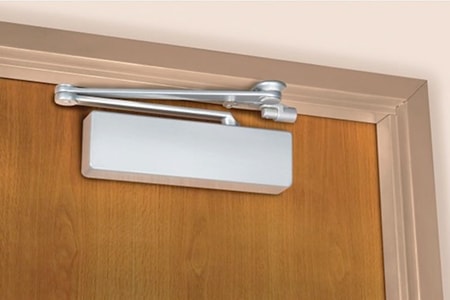
Another option for commercial places is the closer with the hold arm. You install this hardware at the top of the door, on the side closest to the hinge. The hold arm automatically closes the door after it opens. Most hold arms come with a setting that keeps the door permanently open if you pull it all the way out. You release it by pulling on the door again, and it returns to closing the door automatically.
Hold arms are relatively easy to install. All you need is a drill and screwdriver to do it. You can finish the job in less than half an hour. While hold arms are usually found in commercial buildings or offices, nothing stops you from installing them at your home.
3 Solutions for Similar Door Problems
Now you know how to keep doors from closing by itself. Besides this, you might encounter the following three additional issues with doors around your home.
1) Sticky Doors
Dirty hinges and issues with the building's foundations usually cause problems with doors around the home sticking. Try these ideas to stop the door from sticking.
- Clean the hinges and lubricate them with some WD40
- Find the place in the frame where the door is sticking
- Inspect the jamb to see if you can add extra space by sanding the frame
- Turn the screw through the latch into the door frame
- Sand down the area on the door, causing the sticking issue
You don’t want to sand the door or frame if you don’t have to, unless the frame is so out-of-square that you don’t have any other choices. In which case here's the types of sanders available to help you. You should to adjust the pins in the hinges if the door has begun to sag.
2) Drafty Doors
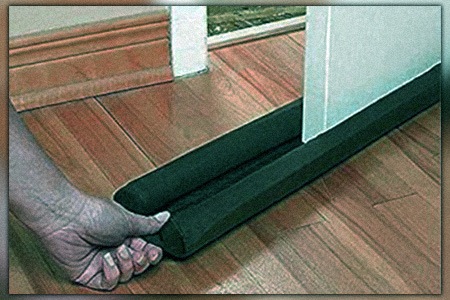
A drafty door can increase your home's energy bill. They disrupt the HVAC or air-con's ability to regulate the room temperature, causing the unit to work harder. You'll need to find the source of the draft to prevent it from opening the door.
Degraded weather stripping is often the cause of the issue. Change the weatherstripping and see if it makes a difference. Some people will place a towel at the bottom of the door if the gusts come from there. You can also install a kick plate with a door sweep that helps block those gusts, too.
3) Warped Doors
If you live in a humid area, the moisture in the air might cause wooden doors to expand and warp. As a result, they don't fit properly into the doorstop.
Warped doors are caused by exposure to a lot of humidity or if they don't fit well into the doorstop. Remove the door and Place wet blankets on it in a shady area. Add weight to the warped side of the door, and it will start to bend back into shape.
Key Takeaways on a Door Closing By Itself
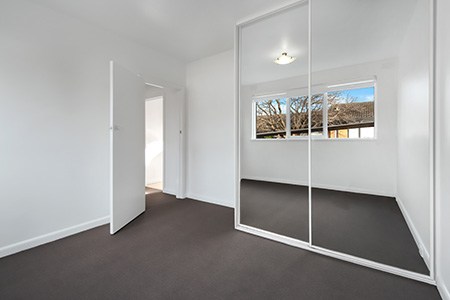
The five primary reasons for doors closing by themselves include:
- Changes in Air Pressure
- Strong Winds
- Misalignment of the Frame and Door
- Settling of the House Foundations
- The Hinges are Misaligned
The following are the four top methods for fixing a door that closes by itself:
- Tighten & Lubricate the Hinges
- Remove & Replace the Hinge Pin
- Bend the Hinge Pin
- Plumb the Door
Investigate these issues and you’ll at least find the causes and the proper fixes. Otherwise there are obvious aids for how to stop a door from closing like a door stopper, wall hooks, and more.
That’s How to Keep Doors From Closing On Their Own
You have to decide if you have the time or desire to fix the problem properly or if using some kind of extra tool in the meantime is okay. By that we mean options like door stoppers or magnet holds. Either way, we’ve provided all the methods and guidance on how to fix the common causes. And that is how to keep doors from closing all on their own and disturbing or annoying you every day.



